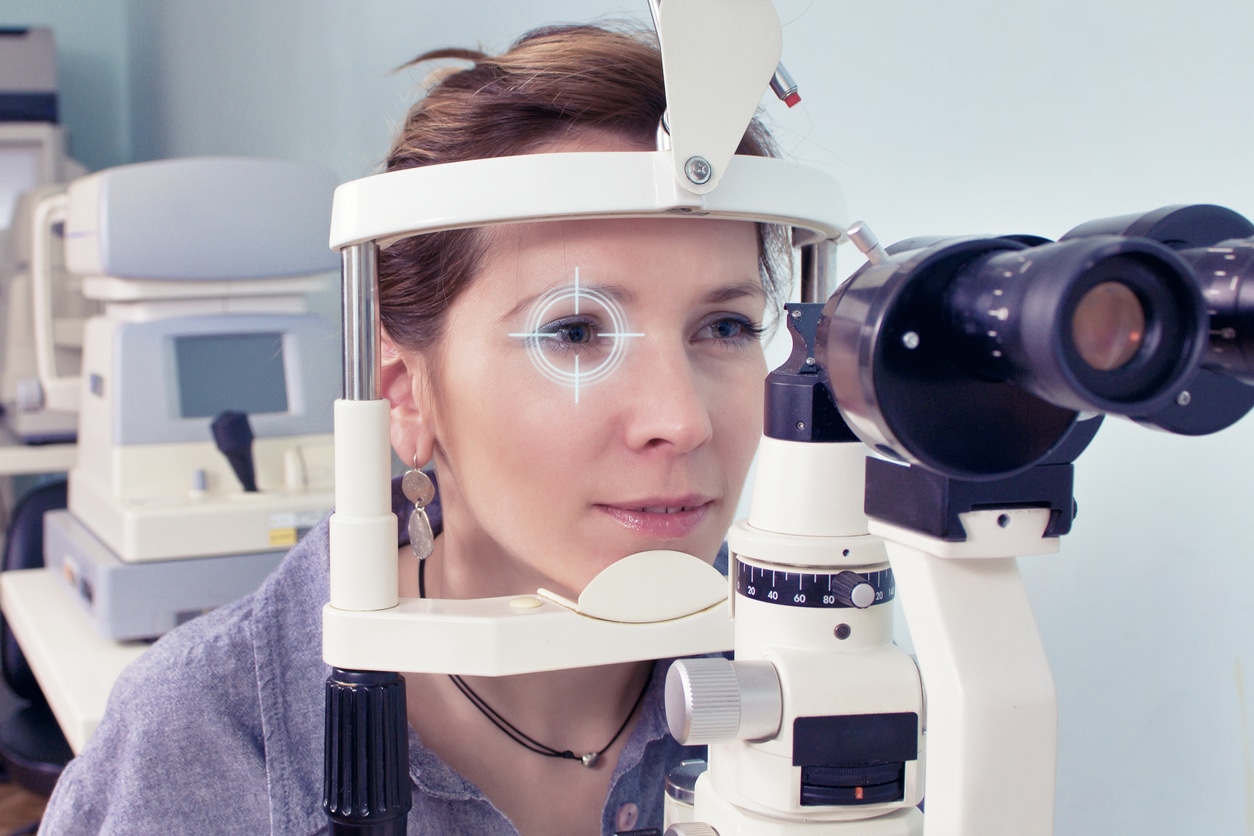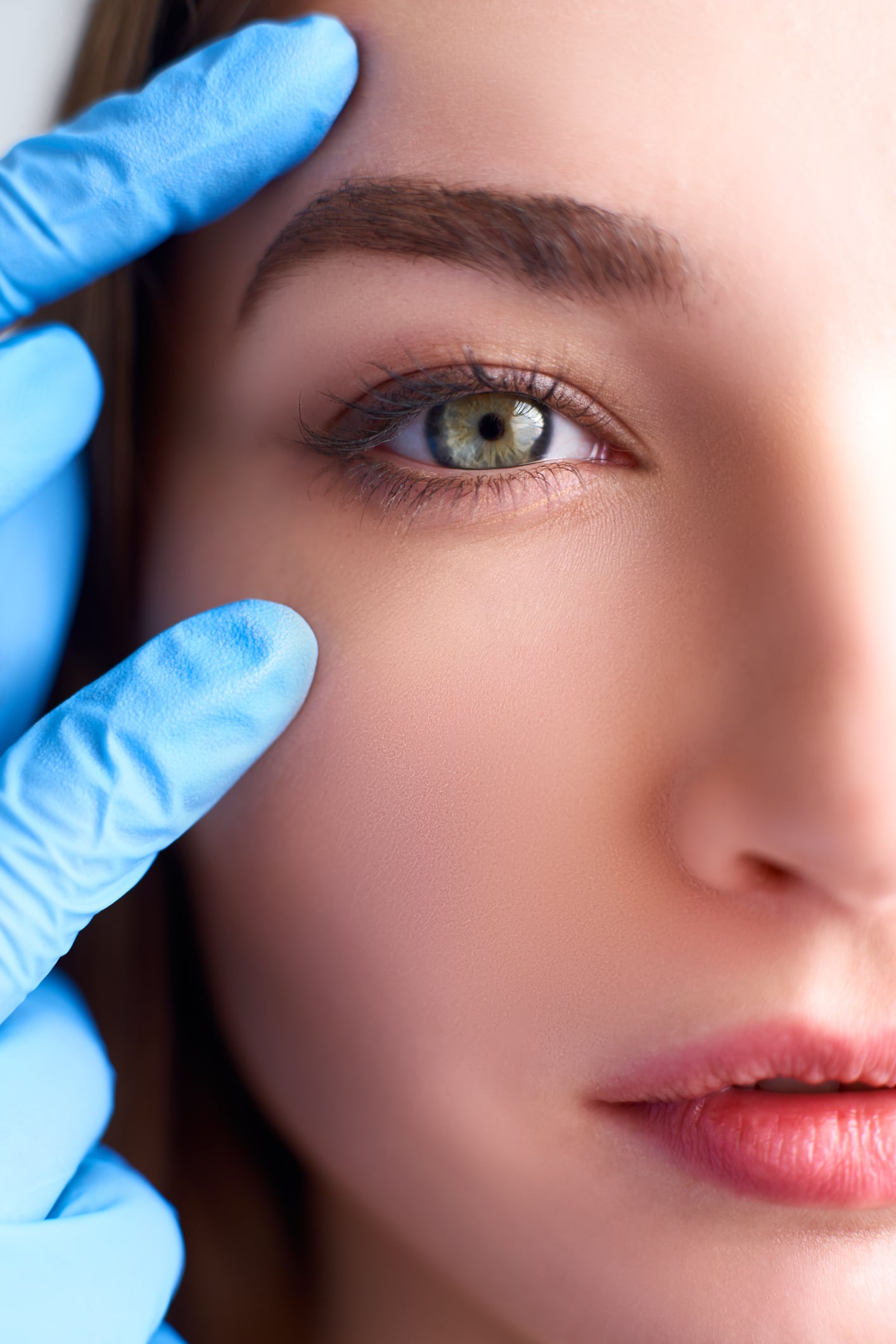What is Laser-assisted Cataract Surgery?
Dr. Groat now offers bladeless advanced laser cataract surgery here in Wilmington with the LenSx laser. Sharing the same technology used in bladeless LASIK procedures, the femtosecond laser is a cool (non-thermal) laser which can create incisions of precision and predictability not achievable with handheld blades.

Who is a Good Candidate for Laser-assisted Cataract Surgery?
As your surgeon, Dr. Groat can help you select the best technology for your surgery based on a custom evaluation of your specific eyes and visual goals. In some cases, traditional cataract surgery may be the best option.
Benefits of Laser Cataract Surgery
At Cape Fear, Dr. Groat believes in staying at the forefront of eye surgery technology and the femtosecond laser is a jump forward. Here are some advantages and benefits for our patients in using the LenSx® laser for cataract surgery:
- The computer guidance provides greater surgical precision.
- All incisions can be made with the laser. This removes the use of any surgical blades.
- Laser scoring of the clouded lens before removal reduces the amount of ultrasound energy needed to break up the lens.
- When opening the capsule, the laser creates far less potential for tearing the capsule than when using forceps.
- When breaking up the cataract, the laser creates less heat, which lowers the risk of damaging the incision.
The Advantages of Using a Lensx® Laser for Cataract Surgery
The LenSx with its computer-controlled software is able to perform several steps of the cataract surgery with automated precision (incisions, capsulorrhexis – the creation of the window in the cataract capsule to allow removal, and lens fragmentation –breaking up the cloudy lens). In addition, the LenSx can treat astigmatism at the time of cataract surgery with incisions not only made with the laser but designed with the exactness of laser imaging as well. Used in combination with an Advanced Technology Intraocular Lens, patients may experience a greatly reduced need for glasses or contact lenses after surgery.
Laser Assisted Vs. Traditional Cataract Surgery
For cataract surgery, Dr. Groat has three jobs for our LenSx® laser. After the laser software creates a 3D image of your eye, the incision location is mapped. Then he uses the femtosecond laser to create the incision in the cornea, removing the anterior capsule of the lens. This provides access to the cataract-clouded lens. For its second job, the laser is used to make a series of cuts in the cataract-clouded lens. This laser scoring of the lens reduces the amount of ultrasound energy needed to break up the lens before suctioning it out. The third possible use of the laser is if you have astigmatism: the laser can create the peripheral corneal incisions that reduce astigmatism. By using the laser for the entry incision, scoring the cataract, and making peripheral incisions, Dr. Groat never needs to use a surgical blade.
Is Laser Cataract Surgery With Lensx® Safe?
Early results suggest that the predictability and safety of cataract surgery with the LenSx may be greater than traditional surgery.
The Laser Cataract Surgery Procedure
At Cape Fear Cataract & Cornea, Dr. Groat uses minimally invasive, small-incision, no-stitch cataract surgery known as phacoemulsification (phaco) surgery. He utilizes the LenSx® femtosecond laser for greater precision and accuracy. Plus, as mentioned above, the laser eliminates the need for a surgical blade. The surgery is remarkably fast, requiring only five to 10 minutes. Here’s how it is done.
The LenSx® system first creates a 3D image of your eye for guidance. This provides Dr. Groat with incredible accuracy when mapping the incision location.
Next, the femtosecond laser creates the corneal incision and removes the anterior capsule of the lens. This allows access to the cataract-clouded lens.

The incision is very small. Now the laser makes a series of cuts in the cataract-clouded lens. A probe is then inserted and delivers ultrasound energy that breaks up the cloudy lens. At the same time, the probe uses suction to gently remove the small lens pieces. The earlier scoring of the lens reduces the amount of ultrasound energy needed to break up the cataract lens. If you have astigmatism, Dr. Groat uses the laser at this point to create peripheral corneal incisions. These reduce the condition. The final step of the surgery is to insert the artificial intraocular lens (IOL). Today’s advanced IOLs are foldable and are inserted through the same small incisions through which the original lens was removed. You can read about your options for IOLs at Cape Feat Cataract & Cornea by clicking here. The small incision size doesn’t require any sutures; it will heal on its own.
How Long Does Surgery Take?
In can seem impossible, but laser cataract surgery at Cape Fear Cataract & Cornea takes just 30 minutes. This includes the time for sedation and placing drops in your eyes. The actual surgery takes just 10-15 minutes.
Does Laser-assisted Cataract Surgery Hurt?
It’s natural to assume using laser energy to remove a cataract must be painful. Nope. These surgeries are painless, and basically over before you know it. When you first arrive at our beautiful Wilmington offices, we give you a mild sedative to help you relax. After that sedative has taken effect, we place anesthetic drops in your eye to keep you from feeling anything. In most people the combination of the sedative and the numbing eye drops makes it hard for them to remember the procedure at all, despite the fact that they were awake the entire time. How great is that? No pain and no memory of your procedure!
Recovery From Laser Cataract Surgery
After your brief surgery, we’ll place an eye patch on your treated eye. We provide you with a protective shield to wear when sleeping for the next several days. Your vision will be blurry at first, but this rapidly improves in just a day or two. Your eye may itch somewhat, but you cannot touch the area at all. You also need to be cognizant of avoiding actions that increase blood pressure to your face. Things such as heavy lifting, bending over, and other actions that move blood to your face are out. We provide you with eye drops that prevent inflammation and infection. They also control the pressure inside your eye when healing.
Full healing can take up to two months, but you can return to normal activity in just a few days. You may or may not require glasses for some tasks after your surgery. This depends on the replacement intraocular lens you selected. If your other eye also has a cataract, we usually schedule the second surgery one to two months after the first.
How Long After Laser-assisted Cataract Surgery Can I Drive?
For most people, healing after laser-assisted cataract surgery takes a few weeks, but you may be able to see clearly after just a few days. Many patients are able to drive within the first week, but wait until we clear you for this before getting behind the wheel. The time you have to wait before driving can also depend on your general health and whether there were any complications during cataract surgery.
What Are the Risks of Laser-assisted Cataract Surgery?
There are a few risks associated with laser-assisted cataract surgery, including swelling, bleeding, damage to the eye, and infections. Most people who experience these complications have conditions like diabetes or high blood pressure. We have to treat these complications quickly to ensure they do not cause permanent damage to the eye. However, the likelihood of suffering any of these risks is 0.5%, making laser-assisted cataract surgery one of the safest surgeries in the country.
Is Laser Cataract Surgery Covered by Insurance?
Because they deem cataract surgery to be medically necessary, insurance companies usually cover the primary costs of laser cataract surgery, including the pre-operative eye scan, the monofocal intraocular lens implant, and the surgical procedure. Some plans do not cover diagnostic procedures or pre-surgery treatments.
What Should I Expect at My Laser Cataract Surgery Consultation?
Before the consultation, make a list of all of the symptoms you are experiencing as well as any medications you take, both over-the-counter and prescription. We will assess your eyes and get a full medical history to ensure you are a good candidate for laser cataract surgery. You will undergo a visual acuity test and a slit-lamp exam. A slit-lamp exam is an illuminated examination of your cornea, iris, lens, and the space between the cornea and iris. We will also perform a retinal exam, which is an examination of your eye’s lens, and tonometry testing to check your internal eye pressure.
What Should I Avoid After Laser Cataract Surgery?
After laser cataract surgery, do not rub your eye or get foreign substances in it like soap or shampoo. Avoid heavy lifting or other strenuous exercises, and avoid swimming or using a hot tub to lower your risk of developing infections. You don’t want to travel in an airplane after surgery, and you also want to avoid wearing makeup for at least a month. Bending over increases pressure in your eyes, so do not do this. Prevent sneezing and stay away from dusty areas or areas with debris that can irritate your eye. Keep your eye dry, and avoid spikes in blood sugar by sticking with fruits and vegetables. Until we clear you for it, don’t drive.
Are the Laser-assisted Cataract Surgery Results Permanent?
Yes. Your new artificial lens cannot develop a cataract. It will provide crystal clear vision for the rest of your life.
What Our Patients Have to Say
-Dwight H.
Is It Dangerous to Leave Cataracts Untreated?
There is only one treatment option when you have a cataract-clouded lens — cataract surgery to remove the lens and replace it with an artificial intraocular lens. If left untreated, the cataract will continue to progress, eventually leading to blindness in the eye. But there is no reason to wait, as cataract surgery is one of the safest, most effective surgeries in the world. In the U.S., the success rate with this surgery is over 98 percent.

Cost of Laser-assisted Cataract Surgery
Cape Fear Cataract & Cornea can assist with your payment options for advanced cataract surgery technologies. We participate with all major insurance carriers, and financing options are available through Care Credit.
Schedule a Consultation With Dr. Brian Groat
Contact Cape Fear Cataract & Cornea, P.A. at 910-769-4590 to schedule your consultation and see if laser-assisted cataract surgery is right for you. Our practice serves Wilmington, NC and the surrounding areas.

